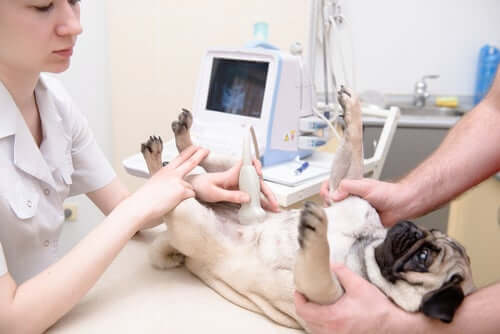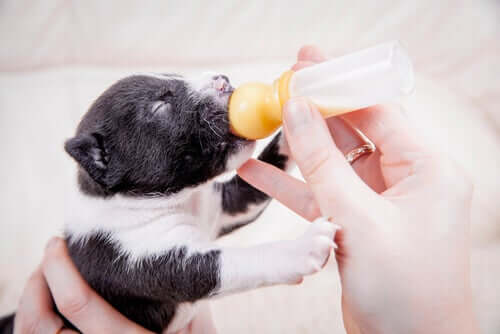Tips For Caring For Pregnant Dogs

The arrival of new puppies in the family is often an extremely important event. And, of course, it’s a very delicate moment as well. At no time should you neglect to tend to or supervise the new mother. To help you, we want to offer a series of tips on caring for pregnant dogs.
Canine gestation lasts between 60 and 65 days, according to the breed. With that in mind, here are a series of basic measures to put into practice throughout each stage of the process.
Caring for pregnant dogs: Medical supervision and care
Pets should remain under strict vigilance by a veterinary doctor. When dogs are preparing to bring a new litter of puppies into the world, this attention becomes indispensable.

As soon as owners suspect their dog may be pregnant, they should take her to the vet to be sure. A veterinarian will help establish the possible date in which birth will occur.
Furthermore, your animal’s doctor will not only verify that everything is going well, but they will also be able to determine how many puppies are on their way. What’s more, the veterinarian will be able to recommend any special measures that may be necessary.
Diet is paramount
When it comes to diet and nutrition, you should never be careless when it comes to pregnant dogs.
First of all, it’s important to be careful not to increase your dog’s portions abruptly. Also, avoid giving your dog dietary supplements and vitamins during the first 6 weeks of gestation. This can cause the pups to develop in a premature and out of control way, producing problems during birth.
During the first 2 weeks, pregnant dogs should continue the same diet they had before becoming pregnant.
Furthermore, they should keep up the same routine when it comes to physical activity, walks, and play. Unless, of course, the veterinarian indicates otherwise.
From the third week onward, just as in human beings, pregnant dogs may experience nausea and occasional vomiting. This can lead to appetite loss, which may last until the fourth week of pregnancy.
Caring for pregnant dogs: The final days of pregnancy
After a month and a half, caring for pregnant dogs involves increasing daily food intake. Furthermore, it’s important to divide her food out into a greater number of meals throughout the day. The puppies in her belly already take up a lot of space, so it’s harder for their mother to eat large portions.
In fact, for the same reason, dogs lose their appetite altogether during the final days of pregnancy.
From the 6th week of gestation and until the puppies wean, mothers should receive puppy food to eat. These formulas contain many more nutrients than adult canine food does.
Pet owners that are used to providing homemade meals should include a diet rich in chicken. Poultry is higher in protein than any other food you can prepare at home. It’s important to only offer your dog boiled chicken, and leave out all seasonings and dressings.
The use of dietary supplements should only take place if your pet’s vet advises it.
Preliminary considerations
Owners of female dogs tend to plan pregnancies ahead of time–especially in the case of purebred pets. Part of the process involves choosing the father.
In this regard, it’s best to submit the potential father to a vet’s exam. This will help rule out any genetic or hereditary diseases as well as any other particular conditions.
Females should also undergo evaluation by a specialist to determine their state of health. The specialist can determine the best moment for conception.
If mating attempts are unsuccessful, females may experience what is known as a false or psychological pregnancy. This is especially true in dogs who have never conceived.
In this case, you’ll observe some symptoms of gestation, such as the growth of the mammary glands. The most extreme cases even involve false labor, which requires pharmaceutical treatment.
Caring for pregnant dogs: Labor and delivery
Bitches are perfectly able to handle the tasks of labor and delivery on their own. Just the same, it’s important that someone that the mother trusts completely remains vigilant throughout the process.

This is the point when knowing the exact number of puppies that are inside the mother is crucial. Within 6 hours of the first puppy’s birth, all of the puppies should already be born. If that’s not the case, then you should seek urgent veterinary attention.
When it comes to mixed breeds where the father is larger than the mother, then the best option is a C-section. This will help to avoid possible complications.
